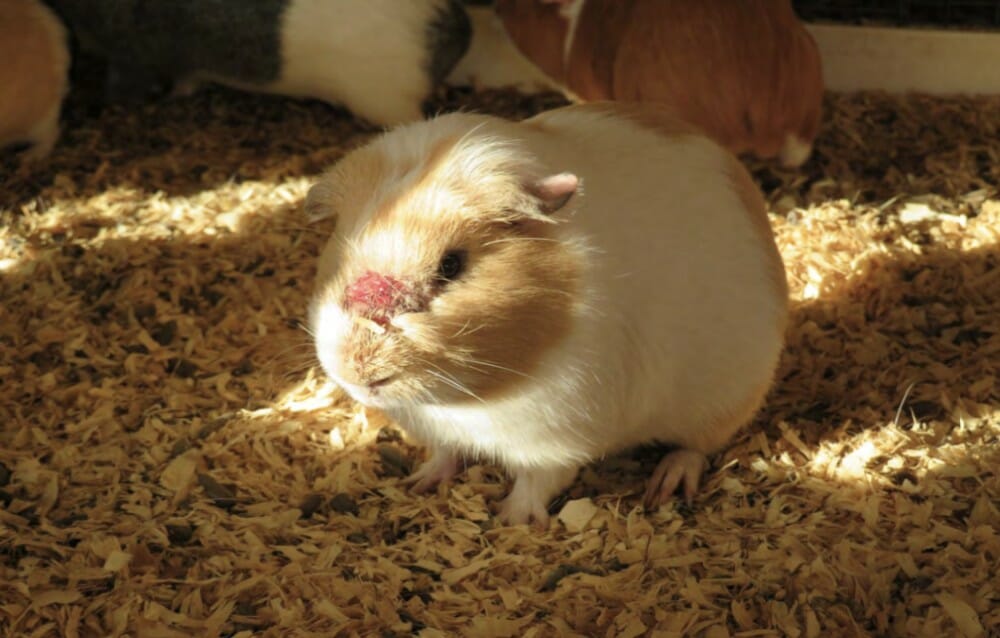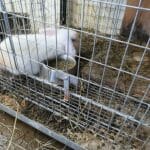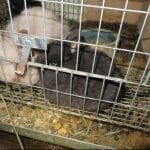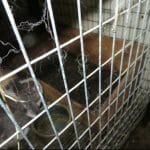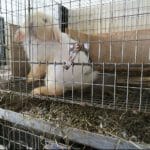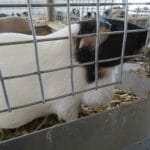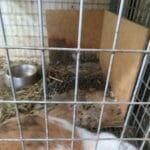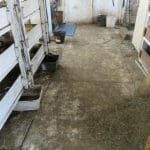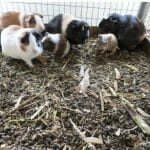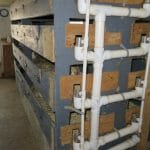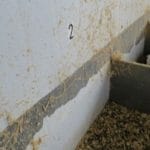When inspectors arrived on-site at a licensed guinea pig farm in Christiana, Pa., they had to use flashlights to see the 905 animals huddled in the darkness, according to an inspection report from the United States Department of Agriculture (USDA).
Two miles away, inspectors conducting a pre-licensing visit observed close to 300 guinea pigs suffering at the hands of a breeder who had no veterinary care program developed, improperly stored their feed and hay, and kept them in a building where the internal temperature was 50 degrees Fahrenheit, according to USDA reports.
At two other USDA-licensed facilities 150 miles away, in Bellefonte and Loganton, more than a thousand guinea pigs and more than 60 rabbits were living in terrible conditions — from untreated medical problems to enclosures and food bowls saturated with feces — before some met untimely ends through “blunt force trauma,” a term for brutally killing an animal by hitting it with a heavy object, in direct violation of the federal Animal Welfare Act, according to USDA reports.
Despite these gruesome conditions, the operators represent only a fraction of the USDA-licensed small animal breeders, and those applying for licensure, in Pennsylvania who racked up atrocious animal care noncompliances during their inspections.
A Lady Freethinker (LFT) investigation into conditions found that 44 small animal breeders throughout the state had noncompliances with USDA animal care codes for the single-year period from Jan. 1 to Dec. 31, 2020 that affected more than 35,000 animals.
Breeders with the cited noncompliances collectively had 25,606 guinea pigs (also known as cavies), 9,902 hamsters, and 64 rabbits within their care. The noncompliances included, according to USDA inspection reports:
- Small animals living in feces-matted cages without access to clean food, water, and bedding
- Severely ill or dying guinea pigs lacking veterinary care, including cavies who had hair loss on over 70 percent of their body, untreated masses and skin conditions, eye abnormalities, swollen and lame feet, and muscle wasting
- Sizable holes in enclosures allowing guinea pigs to fall out of their enclosures to possibly be injured or otherwise escape
- Lethargic, unresponsive, and dying newborn guinea pigs left in pens to be trampled by adults in already overcrowded enclosures.
Even after USDA inspectors warned breeders about needed corrections, nearly a third of the breeders had repeated animal care noncompliances over the course of 2020, according to the inspection reports.
The unsanitary and inhumane conditions, which spanned nine Pennsylvania counties, appeared to be the “norm” for a majority of the licensed breeders in the state; of the 64 licensed guinea pig breeders, 40 — or 62.5 percent — had noncompliant ssues (NCIs) marked on their inspection reports in the single year period, according to data provided by the USDA.
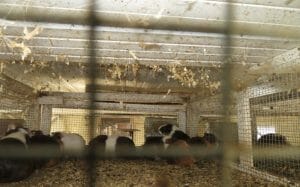
Guinea pigs in a spiderweb-strewn enclosure at a licensed facility on Esh Lane. (Courtesy USDA)
Forty-two of the 44 breeders — including six breeders who had issues with noncompliance dating back through 2014 — faced no enforcement action by the USDA beyond inspectors noting the care noncompliances on their inspection reports or “teachable moment” forms, according to an enforcement database to which the USDA referred LFT.
One faced an administrative complaint due to the “gravity” of his noncompliances in November 2021, while another faced an “official warning” in June 2021 for an alleged lack of adequate veterinary care, according to USDA documents.
Together, the small animal breeders covered by this report racked up more than 162 noncompliant items in 2020 alone, according to data from the USDA.
“These breeders created thoroughly inhumane and unacceptable living conditions for guinea pigs and other small animals that have gone largely unnoticed by the public,” said Nina Jackel, founder and president of Lady Freethinker. “Pennsylvania legislators must create guidelines for improving local enforcement of the federal Animal Welfare Act and put policies in place to ensure that the owners of these horrific facilities are brought to justice and animals in the state are protected from future abuses.”
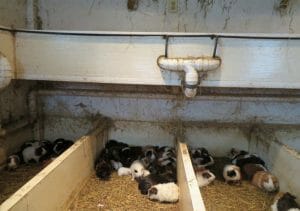
Guinea pigs in a crowded, filthy enclosure at a licensed facility on Springville Road in Ephrata, Lancaster County, PA(Courtesy USDA)
Viewing inspection reports for 2021 showed that 31 of the breeders in this report continued to have issues with compliance — including 14 who had multiple noncompliance issues within the year (or 45 percent). They all kept their licenses while racking up 103 compliance issues, as of the beginning of October 2021, according to USDA inspection reports.
Conditions for the animals in 2021 under those breeders’ care — including at least 26,629 guinea pigs and 173 rabbits — involved feeders with little to no food, unclean water, incomplete records, guinea pigs with untreated masses and eye infections, room temperatures as low as 51 degrees Fahrenheit and as high as 87 degrees Fahrenheit, and continued filth, according to the reports.
Inspectors also found a decomposing guinea pig infested with maggots in an enclosure during one inspection, and a filthy waste removal room with a wheelbarrow full of dirty bedding, sawdust, and dead guinea pigs during another inspection, according to the reports.
Widespread Abuse by Guinea Pig Breeders in Pennsylvania
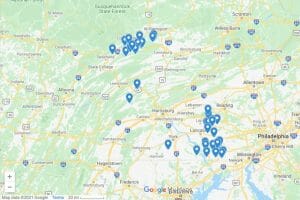
Locations of PA small animal breeders with animal care violations in 2020. (Image created by Lady Freethinker via Google Maps)
LFT filed multiple Freedom of Information (FOI) requests to the USDA to obtain the findings and received hundreds of pictures, seven videos, and almost 600 pages of inspection reports looking at small animal care noncompliances at USDA-licensed facilities in Pennsylvania.
Of the 44 individuals with reported noncompliances, 39 breeders were USDA-licensed and five were applying for licensure at the time we received the records.
Eighteen of the breeders with animal care noncompliances last year — or 41 percent — lived in Lancaster County, notoriously known as the “puppy mill” capital of the East. Their noncompliances included crowded pens, multiple guinea pigs with untreated medical issues, dead guinea pigs left in soiled enclosures, inadequate cleaning, and rusty feeders with jagged edges that could injure the animals, according to the reports.
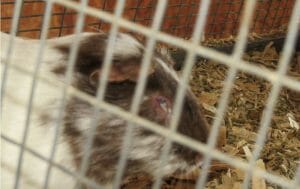
A guinea pig with an untreated eye abnormality at a licensed facility on E. Winter Road in Loganton, Clinton County, PA(Courtesy USDA)
Clinton County had the second-highest number of breeders with noncompliances, or 25 percent of the total.
Loganton — a town in Clinton County’s Amish country with a population of less than 500 people — had more than 10 times the amount of guinea pigs than residents. The 10 Loganton-based breeders had a collective 5,904 guinea pigs living in squalor, with some of the worst noncompliances documented in the inspection reports.
One breeder, on W. Winter Road, had cited noncompliances during three inspections within the single year period, with repeated noncompliances including filthy enclosures, guinea pigs with untreated masses and swollen feet, and incomplete sales records. Despite little improvement being made between the three inspections, this breeder’s number of animals more than doubled from 162 guinea pigs in January to 356 guinea pigs in October, the time of the year’s last inspection involving the noncompliances.
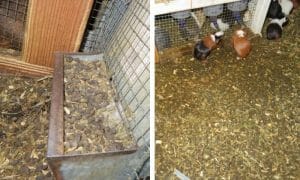
One breeder in Loganton, who more than doubled his guinea pigs, showed no improvement on follow up inspections in February (left) and October (right). (Courtesy USDA)
Another breeder on Kreamer Lane in Loganton, whose guinea pig farm became the target of a Pennsylvania State Police investigation in May 2020, also had cited, repeated noncompliances within the single year period.
Inspectors noted multiple guinea pigs with health issues at each visit, including lethargic newborns housed with too many adults, young guinea pigs with eye abnormalities, and a dead newborn “embedded” in the filthy bedding of an enclosure. Inspectors also noted that 90 percent of enclosures had excess feces, including near the animals’ water containers and within their food bowls. The breeder also was using blunt force trauma to kill animals, according to inspection reports.
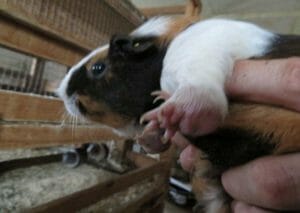
A guinea pig with an untreated swollen foot at a licensed facility on Kreamer Lane in Loganton, Clinton County, PA (Courtesy USDA)
The other counties whose breeders had issues with noncompliance, according to USDA inspection reports:
- Chester County had four breeders with noncompliances, or 9 percent of the total, that spanned incomplete records, enclosures with large, chewed holes that were big enough to allow guinea pigs to escape and be injured, untreated masses, improper storage of food and bedding, and overcrowded enclosures.
- Union County had three breeders with noncompliances, or 7 percent of the total, that spanned improper food storage, wet and fecal-saturated enclosures, and guinea pigs with untreated medical problems and a lack of veterinary care.
- Centre County had three breeders with noncompliances, or 7 percent of the total, that spanned filthy enclosures, incomplete records, overcrowded pens, and a breeder using blunt force trauma to inhumanely euthanize animals.
- York County had two breeders with noncompliances, or 5 percent of the total, that spanned incomplete records, loose guinea pigs, and a buildup of filth and cobwebs around enclosures
- Juniata, Lycoming, and Perry Counties all had one breeder with documented noncompliances, each of which represented 2 percent of the total. The breeders’ respective noncompliances included no records of guinea pigs on hand and filthy water bowls, guinea pigs with untreated masses and dirty feeders and water spigots, and a buildup of filth and cobwebs around enclosures.
Thirteen of the 44 breeders — or nearly 30 percent — had repeat issues of noncompliance within the single year period.
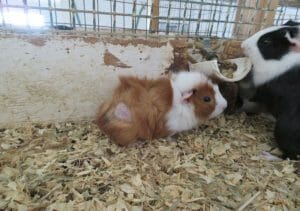
A guinea pig with hair loss at a licensed facility on East Valley Road in Loganton, Clinton County, PA(Courtesy USDA)
Andre Bell, a spokesperson for the USDA’s Animal and Plant Inspection Services (APHIS), told Lady Freethinker that five USDA inspectors cover the total area spanned by the breeders with noncompliances.
“Inspectors determine whether a facility is in compliance,” Bell said via email. “A noncompliance (violation) is a noncompliance regardless of the reason.”
Bell directed LFT to the agency’s enforcement database when asked about accountability follow-ups by inspectors.
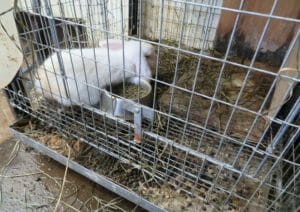
A rabbit in a filthy cage at a licensed breeder on Jacksonville Road in Bellefonte, Centre County, PA. (Courtesy USDA)
That database — encompassing official warnings, notice of alleged violations, settlement agreements, administrative complaints, decisions and orders — turned up only two filings regarding two of the 44 USDA-licensed breeders when searched by name and by license number, although six of the 44 breeders — or almost 14 percent — had inspection reports and some “teachable moments” dating back to 2014.
(A note that according to our review, the USDA enforcement database only includes enforcement actions starting from 2014 onwards. The USDA did not respond to requests for clarification about whether any of the breeders covered by this report had been held accountable by the agency prior to that year).
Of the two filings we located, one was an administrative complaint, filed by the USDA in November 2021, that said one breeder was killing animals with blunt force trauma, had failed to say to whom he was selling the guinea pigs, had incomplete records of the number of animals on hand (including newborns) and of sales and euthanasia records, and had failed to keep his premises clean and in good repair, with an accumulation of feces, hair, discarded food, dirt, grime, and debris, leading the agency to conclude, “The gravity of the violations alleged in this complaint is great,” according to the complaint.
The complaint also notes that Animal Control of Centre County — not a federal agency, and not connected to the USDA — issued two citations for neglect in October 2020 for overcrowding in unsanitary living conditions and failure to provide care to guinea pigs with open wounds. The complaint notes the breeder pleaded guilty to the counts in Magisterial District Court — for which he paid a fine of $645.08.
The second filing, from June 22, 2021, cited a breeder for alleged violations of adequate veterinary care following a May 21, 2021 site inspection, according to the USDA document.
In two other instances that made headlines, it took state law enforcement — acting on animal cruelty tips from animal rights groups — to get accountability for some of these sweet animals.
Connections to the Notorious Puppy Mill Trade
At least one of these small animal breeders also has connections within the state’s notorious puppy mill trade.
A recent June 4 inspection by the Pennsylvania SPCA that resulted in 13 dogs being removed from a repeat puppy mill breeder also resulted in 11 charges of animal cruelty against his son (one of the guinea pig breeders in this report) — including seven counts of lack of veterinary care, three counts of lack of potable water and one count of reckless ill treatment of animals.
Charging documents for that guinea pig breeder show those 11 charges of animal cruelty involved dogs. The lack of veterinary care impacted at least seven dogs — including five Havanese-type dogs, a poodle, and a mini-poodle — and spanned chronic ear infections, advanced dental disease, overgrown nails, matting, pododermatitis (an inflammation of the skin of the paw), and conjunctivitis requiring medication, according to the charging documents.
One of the Havanese dogs requiring medical care and two additional Havanese dogs also had no access to drinkable water, according to the charging documents.
The family has racked up 44 offenses related to animal cruelty, neglect and kennel conditions since 2013, as well as at least $2,200 worth of fines, according to Lancaster Online.
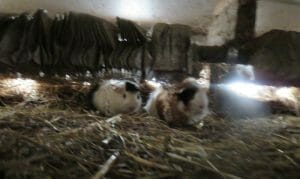
Guinea pigs on the loose after escaping from their enclosure at a licensed facility on Spangler Road in Seven Valleys, York County, with violations back through 2014 (Courtesy USDA)
Life-threatening conditions at USDA-licensed guinea pig farms
Guinea pigs and other small animals — such as mice, gerbils, hamsters, and rabbits — might attract a lot of attention in pet store windows with their large eyes and calm or quirky personalities.
But their “cuteness” factor hasn’t earned them much attention or protection by legislators or authorities. The Animal Welfare Act (AWA) — the only federal law in the United States covering welfare requirements for species used in research, exhibition, transport, or by dealers — establishes only minimum care guidelines for small animals.
For small animals, the basic protections afforded by the AWA include space requirements that allow animals to “make normal postural adjustments with adequate freedom of movement,” enclosure temperatures between 60 and 85 degrees Fahrenheit, fresh air and proper ventilation to minimize drafts or odors, ample lighting, and access to clean food and water.
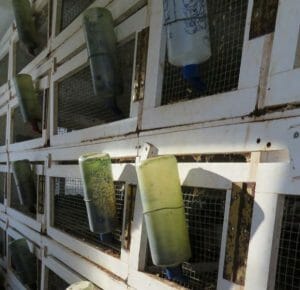
Slimy water bottles at a licensed facility on Esh Lane in Loganton, Clinton County, PA (Courtesy USDA)
In the USDA’s “Animal Care Inspection Guide” — the agency’s official, 317-page manual for inspectors — guinea pigs are mentioned a scarce seven times, while hamsters and rabbits each received only six references.
Those notes reported that licensed pet stores must inventory all small animals, that guinea pigs and hamsters can’t be housed in outdoor areas, that different species can’t be kept in the same enclosure, and that signs of pain and distress in the animals can include lethargy, anorexia, sunken eyes, “hunched” appearances, and decreased activity including food or water consumption.
Breeders, upon being licensed, are required to understand and follow these guidelines. Yet conditions at dozens of these licensed facilities proved life or death for their inhabitants.
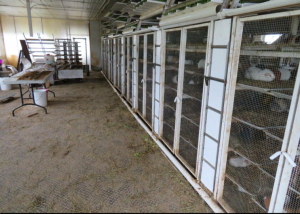
The inside of a licensed facility on N. Castle Fin Road in Delta, York County, PA (Courtesy USDA)
Inspectors found eight dead guinea pigs at a licensed facility on Osceola Drive, in Lancaster County, during a single inspection. Other guinea pigs sported skin abnormalities and hair loss, while lethargic newborns cowered in enclosures overcrowded with adults, according to the reports.
The inspector noted during the same inspection that the filthy enclosures hadn’t been sanitized for at least five months. During a follow-up inspection, the inspector noted a continued build up of debris near the animals’ water supply, as well as cobwebs clinging to the walls, windows, and ceiling, according to the reports.
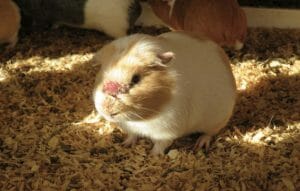
A guinea pig with untreated hair loss at a licensed facility on Osceola Drive in Lancaster County, PA (Courtesy USDA)
At a Clinton County-based facility of a breeder who also was cited for noncompliances during multiple inspections in the single year period, inspectors reported a guinea pig with hair loss on over 70 percent of the body, another guinea pig chewing on an untreated swollen foot, and multiple guinea pigs with wet and matted fur. The temperature inside their enclosure was 42 degrees, according to the reports.
The guinea pigs lived in filthy enclosures, meshed by spider webs, where more than half of the water bottles were coated in thick green slime, feeders saturated with feces had jagged and rusty edges that could cause injury to the gentle guinea pigs, and the wire floors were falling out of some of the cages, according to the reports.
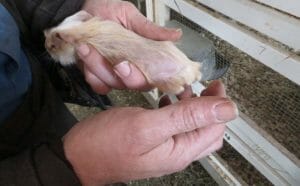
A guinea pig with untreated hair loss on 70% of his body at a licensed facility on Esh Lane in Loganton, Clinton County, PA. (Courtesy USDA)
Inspectors found a dead guinea pig at another Loganton-based facility on Wagon Wheel Lane during their second inspection of 2020. At that same visit, they found eight other guinea pigs who needed veterinary treatment, including swellings that the breeder had allegedly self-treated with antibiotics, according to reports.
A previous inspection had found other veterinary issues, including lethargic babies housed with too many adults, guinea pigs with skin abnormalities, five guinea pigs with untreated masses— and also filth and feces in feeders and enclosures and improper food and bedding storage, according to the reports.
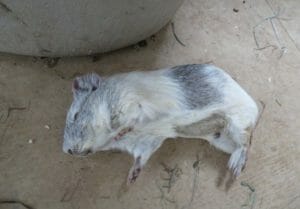
A dead guinea pig found at a licensed facility on Wagon Wheel Lane in Loganton, Clinton County, PA. (Courtesy USDA)
None of these animals were rescued through enforcement action. Four of the five breeders who were cited for noncompliances during their pre-licensing inspections also have since been granted USDA licenses, according to documents from the USDA.
Seven breeders covered in this report have since voluntarily cancelled their licenses, according to USDA records.
Continued Noncompliance in 2021
Viewing APHIS inspection reports for the breeders in this report from Jan. 1 through September 2021 revealed 83 total inspections, including nine visits where inspectors couldn’t access the property because no one was home.
Of the 74 inspections where they did view conditions, inspectors documented noncompliance 49 times — meaning that they observed needed improvements at 66 percent of inspections.
The continued noncompliant conditions involved 31 of the breeders identified in this report. Fourteen of those breeders — or 45 percent —were repeat offenders, with issues documented over multiple inspections from January through September 2021.
The USDA categorizes noncompliances as “direct,” which the agency defines as noncompliances that have a serious or severe adverse effect on the health and well-being of an animal that inspectors note during the inspection; “critical,” which the agency defines as noncompliances that have a serious or severe adverse effect on the health and well-being of an animal at any time; and “non-critical,” which are issues of noncompliance that need to be corrected to keep animals safe.
The USDA also categorize some issues as “teachable moments,” which aren’t included on the inspection forms. The criteria the agency uses to classify something as a “teachable moment” is complicated, but the bottom line is that the conditions are still noncompliances that need to be addressed.
For 2021, small animal breeders in this report cumulatively racked up four direct noncompliances, 99 non-critical noncompliances (including nine visits where no one was home), and seven “teachable moments.”
The documented “non-critical” conditions for small animals were similar to those documented by inspectors in 2020 and included exposed wires, cobwebs, feeders with little to no food, unclean water, open food and hay storage, incomplete records, pigs with untreated medical issues (including masses and eye infections), fly and rodent infestations, room temperatures as low as 51 degrees Fahrenheit and as high as 87 degrees Fahrenheit, filthy enclosures, and loose guinea pigs.
Inspectors also observed a decomposing guinea pig in an enclosure infested with maggots, and a filthy waste removal room with a wheelbarrow containing dirty bedding, sawdust, and dead guinea pigs, according to inspection reports.
The “teachable moments” issued to the breeders related to overcrowded guinea pig pens, open windows without screens that allowed flies to infest the guinea pig area, incomplete records for guinea pig births and deaths, and enclosures with roughened scale and that were beginning to crack, according to USDA records.
The breeders with noncompliances in both 2020 and through September 2021 resided in eight counties:
- Lancaster County had 11 breeders, or 35 percent of the breeders, with continued compliance issues in 2021
- Clinton County had nine breeders, or 29 percent of the breeders, with continued compliance issues in 2021
- Chester County had four breeders, or 13 percent of the breeders, with continued compliance issues in 2021
- Union and York counties each had two breeders, or each with 6 percent of the breeders, with continued compliance issues in 2021
- Lycoming, Juniata, and Centre counties all had one breeder, or each with 3 percent of the breeders, with continued compliance issues in 2021.
The breeders who continued to have compliance issues in 2021 cumulatively had at least 26,629 guinea pigs and 173 rabbits within their care throughout the year, according to inspection reports.
The USDA online database of inspection reports also showed that four of the breeders with noncompliance in 2020 had not had an annual visit in 2021 as of the end of September, including one breeder whose last inspection was in February 2020 — meaning more than 21 months have passed since the last inspection when noncompliance was noted.
The most recent inspection for the breeders covered in this report, at the time of this story’s publication, was Sept. 2.
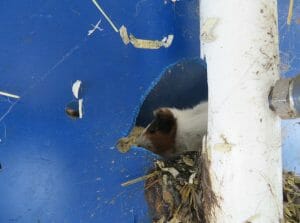
A guinea pig is visible through a hole in his enclosure at a USDA-licensed facility. (Courtesy USDA)
End This Torture for Guinea Pigs
LFT asked the USDA where these small animals were going and was told to file a Freedom of Information request. We did so, but we were informed that sales records are inspected on site and that the agency does not keep copies of that documentation.
Meanwhile, while Pennsylvanians have been fighting against atrocious conditions by “puppy mill” breeders for decades, the plight of guinea pigs and other small animals has largely escaped mainstream news coverage or animal rights campaigns.
It is time for this widespread and atrocious abuse to stop.
The USDA must start leveraging its enforcement action to actually hold noncompliant breeders accountable.
Local law enforcement must crack down on breeders whose continued animal cruelty relies on understaffed or lenient federal inspection agencies.
If you’re interested in seeing the full listing by USDA license of the breeders and their noncompliances from 2020, you can see those details here.
SIGN: Justice for Sick, Dying Guinea Pigs and Rabbits at USDA-Licensed Pennsylvania Breeders
The images below are just a handful of the hundreds we received.
- Rabbit in filthy conditions at a licensed facility in Jacksonville Road in Bellefonte, Centre County, PA (Courtesy USDA)
- Rabbits in filthy conditions at a licensed facility in Jacksonville Road in Bellefonte, Centre County, PA (Courtesy USDA)
- A rabbit in filthy conditions at a licensed facility in Jacksonville Road in Bellefonte, Centre County, PA (Courtesy USDA)
- A rabbit in filthy conditions at a licensed facility in Jacksonville Road in Bellefonte, Centre County, PA (Courtesy USDA)
- A guinea pig mama with an untreated mass in a licensed facility on Freemont Road in Nottingham, Chester County, PA (Courtesy USDA)
- A small animal in filthy conditions at a licensed facility in Jacksonville Road in Bellefonte, Centre County, PA (Courtesy USDA)
- Stacked guinea pigs at a licensed facility in Woods Road in Oxford, Chester County, PA (Courtesy USDA)
- Guinea pigs in filthy conditions at a licensed facility on Wengerd Road in Mifflinton, Juniata County, PA (Courtesy USDA)
- Guinea pigs in exposed wood containers at a licensed facility on Petersburg Road in Allenwood, Union County, PA (Courtesy USDA)
- Guinea pigs inside a licensed facility on Knarr Road in Jersey Shore, Lycoming County, PA (Courtesy USDA)
Editorial Note: This report was updated to reflect that seven of the breeders covered in this report voluntarily cancelled their licenses prior to publication of this story.

